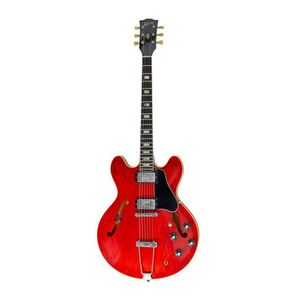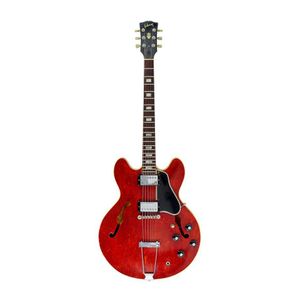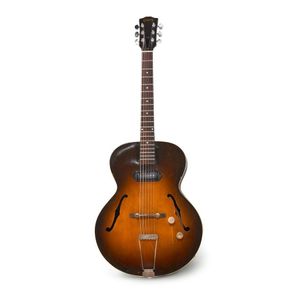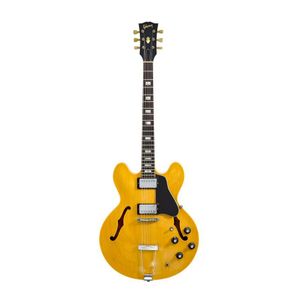1969 Gibson ES-340 Blonde Electric Guitar with OHSC
You must be a subscriber, and be logged in to view price and dealer details.
Subscribe Now to view actual auction price for this item
When you subscribe, you have the option of setting the currency in which to display prices to $Au, $US, $NZ or Stg.
- Mother-Of-Pearl - Mother-of-pearl, technical name "nacre", is the inner layer of a sea shell. The iridescent colours and strength of this material were widely used in the nineteenth century as an inlay in jewellery, furniture, (especially papier mache furniture) and musical instruments.
In the early 1900s it was used to make pearl buttons. Mother-of-pearl is a soft material that is easily cut or engraved.
Nowadays it is a by-product of the oyster, freshwater pearl mussel and abalone industries. - Rosewood - A dense timber that varies in shade to very light brown to almost black. When rosewood is cut and sanded the colour of the timber will turn black, and after polishing and exposure to daylight, the surface will gradually lighten over time to light brown with black streaks.
The name comes from the odour emanating from the timber when it is planed, sanded or cut.
Rosewood was very popular for use in Victorian furniture in the second half of the 19th century, and at that time most of the rosewood was imported from Brazil. However it also grows in India and Indonesia.
It is used in the sold for chairs and table legs, but for carcase furniture such as side cabinets and bookcases, and for table tops it is always used as a veneer. - Maple - Maple, native to North America, is a dense heavy timber from light to yellow-brown in colour. It has very little distincive graining unless it is one of the variants such as birds-eye maple or burr maple, so was not used extensively for furniture in 18th and 19th century, where cabinetmakers and designers preferred timbers with more distinctive features such as mahogany, walnut, rosewood and oak.
Birds-eye maple has a seres of small spots linked by undulating lines in the grain, is highly sough and is used as a decorative veneer. Burr maple has larger and irregular grain swirls than birds-eye maple.
This item has been included into following indexes:
Visually similar items

A Gibson ES-335 'Cherry' electric guitar, 1972, American made, serial number 752661 stamped to rear of headstock, 'Norlin' white rectangular printed maker's label to interior inscribed with model and serial numbers, six nickel 'Kluson Deluxe' machine heads

A Gretsch 6118 Anniversary 'Smoke Green' electric guitar, 2003, Japanese made, serial number JT03-052465, polyurethane '2-Tone Smoke Green' finish, six deluxe high gear ratio machine heads, hollowbody construction with 'F' holes, bound maple body and neck,

A Gibson ES-335 'Cherry' electric guitar, 1968, American made, serial number 873256 stamped to rear of headstock, 'Orange Oval' printed maker's label to interior inscribed with model and serial numbers, six nickel 'Kluson Deluxe' machine heads, bound lamin

A Gibson Es-150 'Sunburst' electric guitar, 1955, American made, serial number 53128, nitrocellulose 'Sunburst' finish, hollowbody construction, laminated maple body, mahogany neck with rosewood fingerboard and 'Dot' pearl inlays, holly headstock veneer wi
